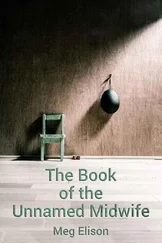Soon after her mother came downstairs surprised, almost panicked, to find her there, as if she were a stranger. She told her to be quiet because her father was sleeping.
“Is Daddy addicted to drugs?”
Jane had moved to the sink to fill a pot with water. “What?”
“Because at school they told us about drugs. They showed us a video.”
“Daddy is sick,” said Jane, and turned the water off.
“Because of drugs?”
“No, sweetie, of course not because of drugs.”
“Then how come?”
Jane placed the water on the stove without answering. She went into the pantry for the rice and when she returned she took the meat out of the fridge and bent down for a cutting board. Becka waited for an answer, but her mother continued to squat in front of the cupboard, one hand on the open door, motionless and refusing to look at her. No one looked at her very much lately. Her mother was usually tired. She often told her to clean her room or asked her to go out and play. The house had never been so quiet, a hush timed by strikes from the grandfather clock and broken only when her father was kicking.
“How come he’s in handcuffs?” she asked.
Now finally her mother stood with the cutting board and looked at her. “Did you see Daddy in handcuffs?”
Becka nodded from the kitchen table.
“Daddy doesn’t want to leave the house,” said Jane, setting the cutting board down and the meat on top of it. “We’re just trying to keep Daddy inside the house.”
Becka didn’t want him inside the house. She heard him at night making noises like he was straining to lift something heavy. She heard the rattle of the handcuffs. His curses filled the house and his mumbling carried through the walls. Sometimes she heard nothing at all. Once she tiptoed to the door and put her head in the room and found him bound to the bed, staring into space. He saw her in the doorway and called to her but she ran away. “Becka, come back!” he cried. “Come talk to me.” She raced down the stairs. “Becka!” he cried out. “Please!” But she kept going.
It left as quickly as it came and he went back to work. After a few months her memory of him bound to the bed faded. They didn’t talk about it. They talked about other things. He came to her recitals again. Once again he woke her in the mornings and made her breakfast and got her ready for school. He never let a day pass without calling her before bedtime. Jane slept in and took care of her at night. That was the routine, the blissful family groove, and it had returned.
Was she up for this? She lay in bed under the covers, her breath visible in the slant moonlight. Really up for it? The long matrimonial haul was accomplished in cycles. One cycle of bad breath, one cycle of renewed desire, a third cycle of breakdown and small avoidances, still another of plays and dinners that spurred a conversation between them late at night that reminded her of their like minds and the pleasure they took in each other’s talk. And then back to hating him for not taking out the garbage on Wednesday. That was the struggle. Sickness and death, caretaking, the martyrdom of matrimony — that was fluff stuff. When the vows kick in, you don’t even blink. You just do. She had to be up for it.
She had nursed him once, and then a second time. About a year and a half of their lives, all told, and by the end of his first recurrence it was a full-time job. He was exonerated of all trifling matters when it returned. They were up against a specter that dwarfed the daily vexings. He could die out there. And so she set to the task of picking him up immediately, of learning how to properly rewarm the skin, of what food to bring with her in the car. She read survivalist manuals and prepared the pack. And when she wasn’t picking him up or preparing the pack, she was making the appointments and taking him to the doctor. She was his support staff and counsel. And when she was driving him home from the doctor she was the sounding board for all the confusion, doubt, anger and frustration. And when not the sounding board she was the cheerleader, dragging him out of the morass of self-pity. And when not the cheerleader, the quiet, supportive presence that said simply, I’m here, said without a word, you are not alone. But it was all-consuming, two intense periods of uncertainty and fear to which she gave herself entirely, often at the expense of Becka — after which, once it was over, in a mad dash to catch up with his life, he went back to work. He treated his first day back like any other day, while she was left wondering just what day is it? What cycle of their marriage had they left off on? How did she resume ordinary life after so many arguments with doctors and late-night car rides to random street corners? He was fine again, as if nothing had ever happened, but she wasn’t unchanged. She was suddenly bereft of purpose. And he wasn’t there to say, I’m here, you are not alone. She didn’t fault him for that. If anything, she envied him. He had an admirable passion for the work he did, and partnership at Troyer, Barr meant he did important work. But she did no favors to anyone by ignoring her own needs. She wanted what he had, something that would not abandon her to her own devices upon his recovery. She needed a purpose not entirely predicated upon other people, loved ones, the taking care of loved ones. She earned her license and started selling real estate.
Was she really up for a third time? To do it right, she would have to quit. She could not keep showing houses with him lost in the world. But what would happen when it was over? When it was over, if she quit and took care of him for however long, what life would she have to return to?
Jane stepped out of bed into the freezing room and walked down the hall to Becka’s. Becka was playing a late-night set of coffeehouse ballads cryptic with yearning, which came to a halt when Jane opened the door.
“What happened to knocking first?”
Gone were the days of her good-faith efforts to fit in with the TV-commercial vision of life. No more running shoes, no more hair gels. She let her heartbreaking weight be what it was, hiding behind the acoustic guitar. Senior year in high school and she refused to so much as order a yearbook. She wore her flannel shirt, Roxy Music tee, black sweatpants. Big surprise.
Jane peered unrepentantly around the room, at the mounds of clothes just waiting for the torch, the slag heap of dirty dishes on desk and nightstand. The room smelled heavily of itself. “Any good developments in here lately, Madame Curie?” she asked.
“I’m making music right now, Mom.”
“And a vaccine or two?”
“Do you even realize how old that joke is?”
“What are you doing up? It’s one in the morning.”
“What are you doing up?”
“Can’t sleep.”
Becka had eight or ten thick dreadlocked strands. They moved about her head the way mitter curtains dance lazily over the car at an automatic car wash, heavy and grayish. Their weight exposed the pale faultlines of her scalp. They cushioned her head as she leaned back on the headboard. “Do you think he fakes it, Mom?” she asked.
“Fakes it?”
“Have you ever Googled it? Google it and see what comes up.”
“Google what?”
“Exactly.”
“What comes up?”
“Some disease horses get when they eat poisonous plants.”
“That doesn’t mean he fakes it.”
“Not faking, then,” she said. “Just… I don’t know… mental.”
“There’s a lot of debate about if it’s psychological or not,” said Jane. “He doesn’t think it is. He thinks—”
“Yeah, I know, I know,” she said. “I know he thinks it’s the legs. I just have a hard time buying it. I think he’s mental.”
Читать дальше












